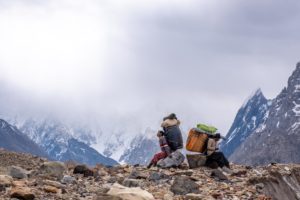Over 70km long, the Baltoro glacier is the jewel of the Karakoram. It is situated about 120km Northeast of Skardu and is the longest glacier outside the polar regions. During more than seven days of the trek on the river of ice passes, you can see four peaks rising above 8000 metres. They include K2, Broad Peak, Gasherbrum and many other high and challenging peaks. A large number of mountaineers and trekkers visit the area each year.
Baltoro Clean-up Expedition 2008
In 2008, over 95 mountaineering expeditions and about 5000 trekkers walked the Baltoro glacier. Every year expeditions and trekking parties on the Baltoro glacier create a large amount of pollution.
Visitors to the area are reporting increased deposits of garbage and human body waste lying on these glacier camps, which, besides seriously damaging the local ecology, are becoming a hazard to the visitors’ health.
Due to this emergency, the Alpine Club of Pakistan launched a Baltoro Clean Up Expedition in collaboration with K2-CNR, Italy. During this cleanup operation members, Alpine Club of Pakistan deployed a large number of local porters to collect all burnable and non-burnable garbage, including packing tins, cartons, polythene bags, foodstuff etc., and carry it out of the area for its correct disposal below Askole – the last village en route to Baltoro glacier. From Askole, the Jeeps moved Garbage to Skardu and finally handed it over to Skardu Municipal Authority.
Request to Mountaineers and Trekkers
Now the season of Mountaineering and Trekking is very near.
Mountaineers and trekkers should leave the area clean as they found it. They should not wait until the last minute. Waste processing is encouraged right from the start. Digging latrine pits is a common practice, but an appropriate location needs to be allocated away from the main camping site and running streams.
Visitors should burn paper, while they should retrieve plastic, tins, metal, glass and bags as they do not degrade. Lack of sanitation can result in the spread of dangerous diseases. Also, one should not dispose of waste in crevasses and river water. Carrying lime to sprinkle in the pit can surely dampen the stench. Human body waste can take a very long time to decompose, and any bio-waste, if frozen, can take centuries to decompose. All members should complete the burning process by the evening before their next-day journey.
The practice of burning plastics is still being followed on the campsites. This causes toxic chemicals to be emitted into the air. These toxic chemicals remain in the air and destroy the ozone layer. There is no natural process that can effectively remove the toxic chemicals from the air, which remain there, causing further damage. We encourage the campers that they should instruct their porters to remove the plastics instead of burning them and dispose of them properly.


